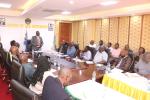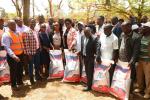H.E. Peter Munya's Speech During The Official Opening Of The 5th Annual Democratic Governance Civil Society Week 12 November, 2013 At Kenya Methodist University
The Deputy Country Director, UNDP Kenya,
Distinguished Guests,
Ladies and Gentlemen,
It gives me great pleasure in officiating at the opening of this important civil society forum. Let me take this opportunity to welcome you all to Meru County. From the outset, allow me to thank you for hosting this event in Meru County. This indeed conforms to our vision of making Meru a conference destination. My government is in process of planning and putting up facilities that can host a conference of a bigger magnitude. Meru, though largely an agricultural county has huge untapped potential for tourism. A part from the beautiful Meru National Park and the famous Lewa conservancy, half of the scenic Mt. Kenya National Park is in Meru. Meru town which is strategically located at the geographical centre of Kenya is rapidly growing into a regional centre of commerce for upper Eastern and Northern Kenya.
The establishment of eighteen banks and many quality hotels some of which have come up in the very recent past and the existence of two main universities and campuses of all national universities is a sign of the pre-eminence of Meru town in northern Kenya. I once more thank you for choosing to host this event in Meru.
I urge you to enjoy the hospitality of Meru people and get some time off to visit some of the choice destinations.
Ladies and gentlemen,
Allow me now to turn to the theme of this conference; Sustaining Democratic Gains and the Role of Civil Society in the New Dispensation.
The ushering in of the new constitution has been generally accepted as the beginning of a new era in Kenya. We were able to retire a constitution that had been used to consolidate and sustain an authoritarian constitutional order. The new constitution which is a product of a popular struggle spanning more than two decades was intended to institutionalize a new democratic and people centred governance.
What then can we point out as the key democratic gains ushered in by the new constitution?.
1. A devolved system of government that empowers the grassroots by devolving power and resources to hitherto marginalized peripheries and hence putting the destiny of the people in their own hands.
2. A freer and more democratic electoral process safeguarded by an independent and more assertive judiciary with a supreme court at the apex.
3. A two chamber parliament that is intended to entrench checks and balances as opposed to a one chamber parliament that had gone rogue.
4. A tamed presidency that is intended to operate within certain legal confines and checked by parliament and balanced by a reformed judiciary.
5. The entrenchment of a popular democratic culture underlined by the requirement of the participation of the people in their own governance.
6. One of the most progressive and detailed bill of rights in the world encompassing both political, civil as well as social and economic rights.
7. Creation of a transitional mechanism that was intended to safeguard and protect the implementation of the new constitution.
The question that imposes itself is then what must we do or continue to do to sustain and consolidate these gains? In other words, are there any enemies of the new constitutional order or put differently, are there forces that are threatened by the new constitutional order who may be fighting it?. What is the place and the role of the civil society in all this?.
- Where is the voice of the civil society?
- On the emphasis of people participation, what does the civil society need to do to restructure and breathe life into the process?
- What is the position of the civil society on the on-going debate between the national and county governments in relation to allocation of revenue and devolution of functions?
- Are there functions that are best suited to be performed by the national government and are there functions that are best suited to be performed by the county government?
- When will the civil society devolve?
- Why are we unable to elevate the debate? Example: the flag and the titles/county development board
- Can we develop sustainable partnerships between civil society and county governments? E.g. street children rehabilitation programme, need to avoid duplication and busy body culture.
What is the Meru county government doing in entrenching and promoting public participation in county governance?
- Involvement of people in generating policies e.g. Meru Rising Conference and CIDP
- Involvement of people in county legislative processes example: public participation bill, co-operatives bill, medial bill,
- Creating a robust civic education department to spearhead popular public education and mobilization/ good area for partnership with civil society.





